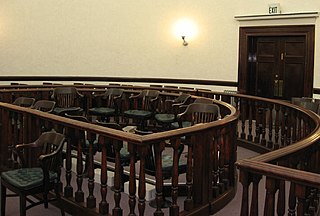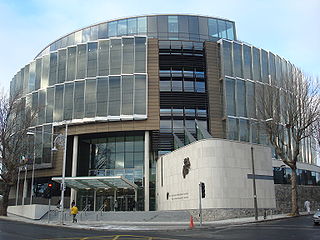A grand jury is a jury empowered by law to conduct legal proceedings, investigate potential criminal conduct, and determine whether criminal charges should be brought. A grand jury may subpoena physical evidence or a person to testify. A grand jury is separate from the courts, which do not preside over its functioning.

A jury trial, or trial by jury, is a legal proceeding in which a jury makes a decision or findings of fact. It is distinguished from a bench trial, in which a judge or panel of judges makes all decisions.

A jury is a sworn body of people (jurors) convened to hear evidence, make findings of fact, and render an impartial verdict officially submitted to them by a court, or to set a penalty or judgment. Most trial juries are "petit juries", and usually consist of twelve people. A larger jury known as a grand jury has been used to investigate potential crimes and render indictments against suspects.

The Terrorism Act 2000 is the first of a number of general Terrorism Acts passed by the Parliament of the United Kingdom. It superseded and repealed the Prevention of Terrorism Act 1989 and the Northern Ireland Act 1996. It also replaced parts of the Criminal Justice Act 1998. The powers it provides the police have been controversial, leading to noted cases of alleged abuse, and to legal challenges in British and European courts. The stop-and-search powers under section 44 of the Act have been ruled illegal by the European Court of Human Rights.
A bench trial is a trial by judge, as opposed to a jury. The term applies most appropriately to any administrative hearing in relation to a summary offense to distinguish the type of trial. Many legal systems use bench trials for most or all cases or for certain types of cases.
Jury tampering is the crime of unduly attempting to influence the composition or decisions of a jury during the course of a trial. The means by which this crime could be perpetrated can include attempting to discredit potential jurors to ensure they will not be selected for duty. Once selected, jurors could be bribed or intimidated to act in a certain manner on duty. It could also involve making unauthorized contact with them for the purpose of introducing prohibited outside information and then arguing for a mistrial. In the United States, people have also been charged with jury tampering for handing out pamphlets and flyers indicating that jurors have certain rights and obligations, including an obligation to vote their conscience notwithstanding the instructions they are given by the judge.

The Special Criminal Court is a juryless criminal court in Ireland which tries terrorism and serious organised crime cases.
Capital murder refers to a category of murder in some parts of the US for which the perpetrator is eligible for the death penalty. In its original sense, capital murder was a statutory offence of aggravated murder in Great Britain, Northern Ireland, and the Republic of Ireland, which was later adopted as a legal provision to define certain forms of aggravated murder in the United States. Some jurisdictions that provide for death as a possible punishment for murder, such as California, do not have a specific statute creating or defining a crime known as capital murder; instead, death is one of the possible sentences for certain kinds of murder. In these cases, "capital murder" is not a phrase used in the legal system but may still be used by others such as the media.
The courts of Northern Ireland are the civil and criminal courts responsible for the administration of justice in Northern Ireland: they are constituted and governed by the law of Northern Ireland.

The Criminal Justice Act 2003 is an Act of the Parliament of the United Kingdom. It is a wide-ranging measure introduced to modernise many areas of the criminal justice system in England and Wales and, to a lesser extent, in Scotland and Northern Ireland. Large portions of the act were repealed and replaced by the Sentencing Act 2020.
The law of Northern Ireland is the legal system of statute and common law operating in Northern Ireland since the partition of Ireland established Northern Ireland as a distinct jurisdiction in 1921. Before 1921, Northern Ireland was part of the same legal system as the rest of Ireland.
Anti-terrorism legislation are laws aimed at fighting terrorism. They usually, if not always, follow specific bombings or assassinations. Anti-terrorism legislation usually includes specific amendments allowing the state to bypass its own legislation when fighting terrorism-related crimes, under alleged grounds of necessity.
From 2000 to 2015, the British Parliament passed a series of Terrorism Acts that were aimed at terrorism in general, rather than specifically focused on terrorism related to Northern Ireland.

In the legal jurisdiction of England and Wales, there is a long tradition of jury trial that has evolved over centuries. Under present-day practice, juries are generally summoned for criminal trials in the Crown Court where the offence is an indictable offence or an offence triable either way. All common law civil cases were tried by jury until the introduction of juryless trials in the new county courts in 1846, and thereafter the use of juries in civil cases steadily declined. Liability to be called upon for jury service is covered by the Juries Act 1974.

The Northern Ireland Act 1973 is an act of the Parliament of the United Kingdom which abolished the death penalty for murder in Northern Ireland, and established the Diplock courts in which terrorist offences were tried by a judge without a jury. It has mostly been repealed, the anti-terrorism provisions having been superseded by subsequent legislation. The death penalty had not been used in Northern Ireland since 1961, when Robert McGladdery was hanged.

The Justice and Security Act 2007 is an Act of the Parliament of the United Kingdom. Its purpose is to facilitate security normalisation in Northern Ireland.
Scheduled offence may refer to:

The Administration of Justice Act 1939 was an Act of the Parliament of the United Kingdom that modified the law in England and Wales with regards to juries in England and Wales.

The Witness Security Programme in Ireland is administered by the Attorney General of Ireland, and is operated by the Garda Síochána, the national police force. Witness protection in Ireland is used in cases of serious, organised crime and terrorism. The programme is under the operational control of the elite Garda Special Detective Unit (SDU), attached to the Garda Crime & Security Branch (CSB).

The Criminal Justice Act 1998 is a law passed in the United Kingdom, which came into force on 4 September 1998. It stipulated that it is an offense to participate in a conspiracy to carry out a course of conduct that leads to an offense in another jurisdiction. It gave courts in England and Wales the authority to try conspiracies to commit offences abroad. The law also provided stricter punishment for being a member of a terror group. Parts of it were replaced by the Terrorism Act 2000 and the Proceeds of Crime Act passed in 2002.






